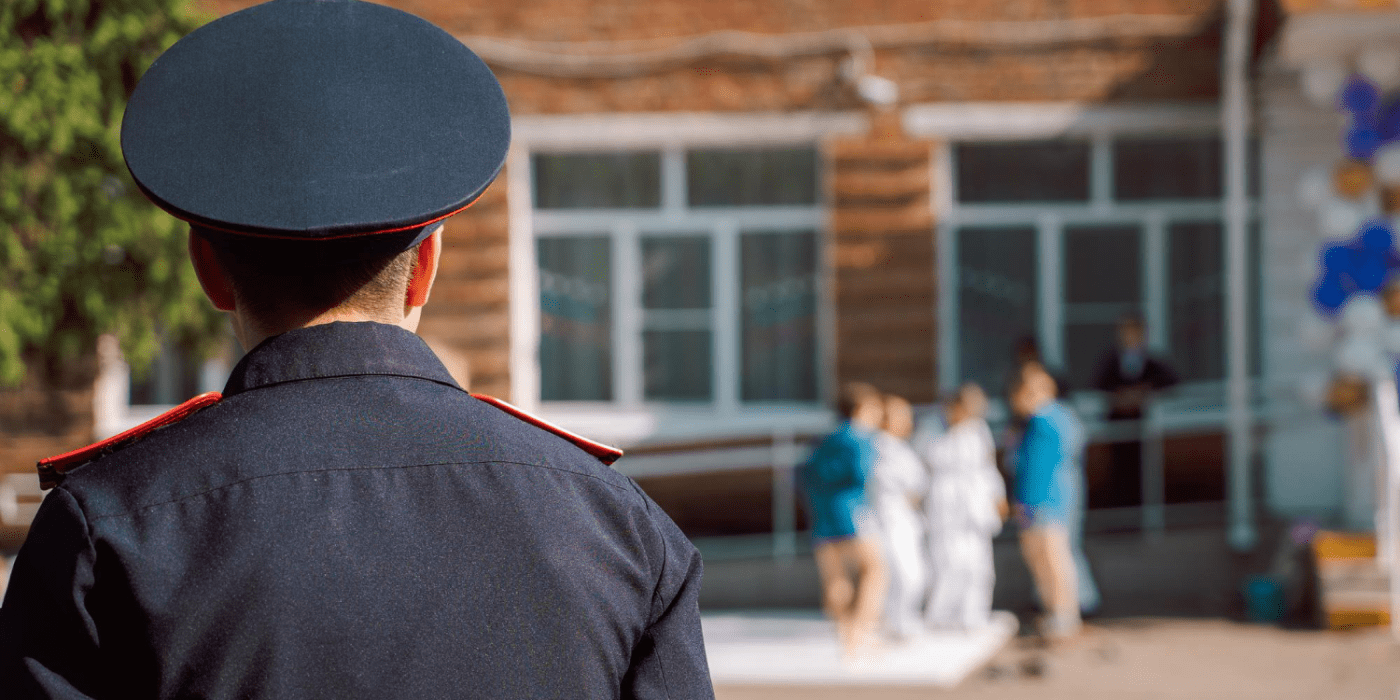Understanding Campus Security: Roles & Responsibilities
Definition of Campus Security
This section will provide a clear definition of what campus security entails. It will explain that campus security refers to the measures and personnel responsible for ensuring the safety and security of individuals, property, and facilities within a college or university campus. It encompasses various aspects such as crime prevention, emergency response, and enforcement of campus rules and regulations.
Importance of Campus Security in Maintaining a Safe Learning Environment
Here, we’ll discuss the crucial role that campus security plays in creating and maintaining a safe learning environment for students, faculty, and staff. We’ll highlight how a secure campus fosters a conducive atmosphere for academic pursuits, promotes student well-being, and enhances the overall quality of campus life. Emphasizing the importance of campus security sets the stage for understanding its significance throughout the article.
Overview of the Article’s Focus
This part will provide a brief overview of the main topics that the article will cover. It will give readers a clear understanding of the areas of focus, such as the roles and responsibilities of campus security personnel, their authority, common FAQs, technological advancements in campus security, training and preparation, community engagement, and partnerships. This overview will help readers navigate the article and understand its structure.
Roles and Responsibilities of Campus Security
Maintaining Safety and Security on Campus Grounds
This section will discuss the primary responsibility of campus security personnel in maintaining safety and security throughout the campus grounds. It will cover activities such as conducting patrols, monitoring surveillance systems, and responding to incidents to prevent and address potential threats to the safety of individuals and property on campus.
Enforcing Campus Rules and Regulations
Here, we’ll explore how campus security personnel are tasked with enforcing campus policies, rules, and regulations to maintain order and promote a safe environment. This may include enforcing parking regulations, addressing violations of conduct codes, and ensuring compliance with campus policies related to safety and security.
Assisting with Emergency Response and Crisis Management
This part will highlight the critical role of campus security personnel in assisting with emergency response and crisis management efforts. It will discuss their responsibilities in coordinating responses to emergencies such as fires, natural disasters, medical emergencies, and security threats, as well as their role in implementing emergency protocols to ensure the safety of individuals on campus.
Providing Assistance and Support to Students, Faculty, and Staff
In this section, we’ll discuss how campus security personnel provide assistance and support to members of the campus community. This may include providing escorts for individuals walking on campus at night, offering directions and information, assisting with vehicle lockouts, and responding to requests for assistance or help in various situations.
Authority of Campus Security Personnel
Legal Jurisdiction and Limitations
This section will explore the legal jurisdiction of campus security personnel and any limitations on their authority. It will discuss the laws and regulations that govern their actions, including any statutory powers granted to them by state or local authorities. Additionally, it will address the boundaries of their authority, such as jurisdictional limits and restrictions on their enforcement powers.
Powers of Arrest and Detainment
Here, we’ll discuss whether campus security officers have the authority to make arrests and under what circumstances. We’ll outline the legal requirements and procedures that must be followed when campus security officers are involved in apprehending individuals suspected of committing crimes on campus grounds.
Collaboration with Law Enforcement Agencies
This part will highlight the importance of collaboration between campus security personnel and local law enforcement agencies. It will discuss the ways in which campus security personnel work closely with law enforcement officers to address safety concerns, investigate incidents, and coordinate responses to emergencies that may occur on or near campus grounds.
Use of Force Policies and Protocols
In this section, we’ll delve into the use of force policies and protocols that guide the actions of campus security personnel. This will include an overview of the principles of proportionality, necessity, and reasonableness that govern their use of force, as well as the training and procedures they follow to minimize the risk of excessive or inappropriate force in their interactions with individuals on campus.
Campus Security Technologies and Innovations
Overview of Technology Used in Campus Security
This section will provide an overview of the various types of technology commonly used in campus security. It will cover a range of technologies such as surveillance cameras, access control systems, emergency notification systems, mobile safety apps, and biometric identification systems. The overview will explain how each technology contributes to enhancing campus security and promoting a safer environment for students, faculty, and staff.
Examples of Innovative Security Solutions
Here, we’ll showcase examples of innovative security solutions that have been implemented on college and university campuses. This may include case studies or success stories highlighting the effectiveness of specific technologies or systems in addressing security challenges. Examples could range from AI-powered surveillance systems to drone patrols and smart access control solutions.
Benefits and Challenges of Implementing Technology in Campus Security
In this part, we’ll explore the benefits and challenges associated with the implementation of technology in campus security. We’ll discuss the advantages of using technology to improve situational awareness, streamline security operations, and enhance emergency response capabilities. Additionally, we’ll address the challenges such as cost, privacy concerns, and the need for ongoing maintenance and upgrades to keep pace with evolving threats and technologies.
Training and Preparation for Campus Security Personnel
Importance of Training for Campus Security Personnel
This section will emphasize the critical importance of training for campus security personnel. It will discuss how comprehensive training programs are essential for equipping security officers with the knowledge, skills, and competencies needed to effectively perform their duties. Emphasis will be placed on the role of training in enhancing preparedness, improving decision-making abilities, and ensuring compliance with relevant laws, regulations, and policies.
Topics Covered in Campus Security Training Programs
Here, we’ll provide an overview of the topics typically covered in campus security training programs. This may include areas such as conflict resolution, emergency response procedures, first aid and CPR, de-escalation techniques, diversity and cultural competency, legal and ethical considerations, report writing, and communication skills. The section will highlight the importance of addressing a diverse range of topics to prepare security personnel for the various challenges they may encounter on campus.
Ongoing Professional Development for Campus Security Personnel
In this part, we’ll discuss the importance of ongoing professional development for campus security personnel. We’ll explore the need for continuous learning and skill-building to stay updated on emerging security threats, new technologies, and best practices in the field. Strategies for facilitating ongoing professional development, such as participation in workshops, conferences, and online courses, as well as opportunities for mentorship and peer learning, will be highlighted.
Community Engagement and Partnerships
Importance of Collaboration with the Campus Community
This section will underscore the significance of collaboration between campus security personnel and the campus community. It will highlight how working closely with students, faculty, staff, and other stakeholders fosters a sense of shared responsibility for campus safety. By involving the community in security initiatives, security personnel can gain valuable insights, support, and cooperation, ultimately enhancing the effectiveness of security measures and promoting a safer environment for everyone.
Building Partnerships with Law Enforcement Agencies and Community Organizations
Here, we’ll discuss the importance of forging partnerships with external entities such as law enforcement agencies and community organizations. Collaborating with local police departments, emergency responders, and neighborhood associations allows campus security personnel to leverage additional resources, expertise, and support in addressing security challenges. We’ll explore strategies for establishing and maintaining effective partnerships to enhance the overall security and well-being of the campus community.
Promoting a Culture of Safety and Inclusivity
In this part, we’ll examine the role of campus security personnel in promoting a culture of safety, respect, and inclusivity within the campus community. We’ll discuss initiatives and programs aimed at raising awareness about safety issues, promoting diversity and inclusion, and fostering mutual respect among all members of the campus community. By actively promoting these values, campus security personnel contribute to creating a supportive and welcoming environment where everyone feels valued and empowered to contribute to campus safety.
Conclusion
Recap of Key Points Regarding Campus Security
This section will provide a concise recap of the key points discussed throughout the article regarding campus security. It will summarize the roles and responsibilities of campus security personnel, their authority, the importance of training and partnerships, and the use of technology in enhancing campus security.
Emphasis on the Role of Campus Security in Ensuring a Safe and Secure Environment
Here, we’ll emphasize the crucial role that campus security plays in ensuring a safe and secure environment for students, faculty, staff, and visitors. We’ll underscore how effective security measures contribute to creating an atmosphere conducive to learning, working, and living, and how campus security personnel are instrumental in upholding this environment.
Call to Action for Continued Support and Investment in Campus Security Measures
In this part, we’ll issue a call to action for continued support and investment in campus security measures. We’ll emphasize the importance of prioritizing resources, training, and technology to enhance campus security and address evolving threats effectively. By rallying support from stakeholders and decision-makers, we can ensure that campus security remains a top priority and that ongoing efforts are made to maintain and improve safety on college and university campuses.
FAQs about Campus Security
1) What Is the Role of Campus Security?
This section will explain the primary role of campus security personnel, which includes maintaining the safety and security of individuals, property, and facilities within the campus community. It will highlight their responsibilities in enforcing campus rules and regulations, responding to emergencies, providing assistance and support, and fostering a culture of safety and inclusivity.
2) What Authority Do Campus Security Officers Have?
Here, we’ll discuss the authority granted to campus security officers, including their powers and limitations in maintaining campus safety and enforcing rules and regulations. We’ll clarify the scope of their authority and the responsibilities they hold in ensuring the security and well-being of individuals within the campus community.
3) Can Campus Security Officers Make Arrests?
This part will address whether campus security officers have the authority to make arrests and under what circumstances. We’ll outline the legal requirements and procedures that must be followed when campus security officers are involved in apprehending individuals suspected of committing crimes on campus grounds.
3) How Do Campus Security Officers Handle Disciplinary Actions?
In this section, we’ll explain the role of campus security officers in handling disciplinary actions, such as enforcing campus policies and codes of conduct. We’ll discuss the procedures for addressing violations and the mechanisms for reporting incidents to appropriate campus authorities for further action.
4) Are Campus Security Officers Allowed to Carry Weapons?
Here, we’ll address whether campus security officers are permitted to carry weapons while on duty. We’ll discuss the policies and regulations governing the use of firearms and other defensive equipment by campus security personnel, as well as the training requirements and protocols that must be followed.
5) What Should I Do If I Encounter a Campus Security Issue?
In this final section, we’ll provide guidance on what individuals should do if they encounter a campus security issue or have concerns about their safety on campus. This may include reporting incidents to campus security, seeking assistance from campus authorities or law enforcement agencies, and accessing support services available to the campus community.


